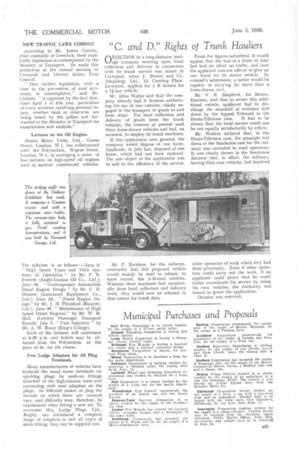"C. and D." Rights of Trunk Hauliers O BJECTION to a
Page 31

If you've noticed an error in this article please click here to report it so we can fix it.
long-distance haulk../age company entering upon local collection and delivery in connection with its trunk service was raised at Liverpool, when J. Brown and Co. (Shipping), Ltd., 12, Canning Place, Liverpool, applied for a B licence for a If-ton vehicle. '
Mr. Allen Walter said that the company already had A licences authorizing the use of -two vehicles, chiefly engaged in the transport of goods to and from ships. For local collection and delivery of goods from the trunk vehicles, the concern at present used three horse-drawn vehicles and had, on occasion, to employ its trunk machines.
if this application were granted, the company would dispose of one horse. Applicant, in July last, disposed of one horse, which had not been replaced. The sole object of the application was -to add to the efficiency of the service.
Mr. P. Kershaw, for the railways, contended that this proposed vehicle would mainly be used to release, to some extent, the A-licence vehicles. Whereas these machines had occasionally done local collection and delivery work, they would now be released to that extent for trunk duty. From the figures submitted, it would appear that the loss of a horse in July last had no effect On traffic, and now the applicant concern offered to give up one horse for its motor vehicle. In counsel's submission, a motor would be capable of carrying far more than a horse-drawn cart.
Mr. V. R. Shepherd, for Messrs. 'Carriers, said that to secure this additional vehicle, applicant had to discharge the standard of evidence laid down by the Appeal Tribunal in the Bouts-Tillotson case. It had to be shown that the local service could not be run equally satisfactorily by others.
Mr. Walters declared that, in the Bouts-Tillotson case, the principle laid down in the Sanderson case for the railways was extended to road operators. It was clearly shown in the Sanderson decision that, in effect, the railways, having their own vehicles, had deprived other operators of work which they had done previously. Even if other operators could carry out the work, if an applicant .ould prove that he could better coordinate his service by using his own vehicles, the Authority was bound to grant the application.
Decision was reserved.




















































































